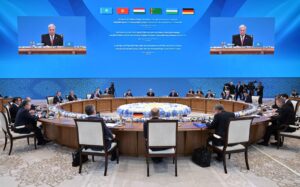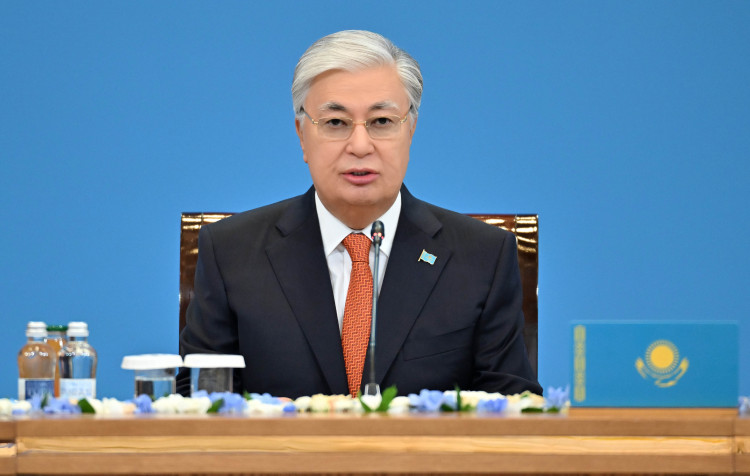ASTANA ( WNAM MONITORING): President Kassym-Jomart Tokayev highlighted the growing mutual interest and ambition to strengthen regional strategic relationships during the meeting of the heads of state of Central Asia and the Federal Chancellor of Germany Olaf Scholz.
“I see this as proof of the Central Asian countries’ and Germany’s interest in and ambition to deepen the regional strategic relationship. Our meeting is intended not only to summarize the results of our joint work but also to outline new ways to deepen cooperation,” said Tokayev.
Tokayev welcomed Scholz, President of the Kyrgyz Republic Sadyr Japarov, President of Tajikistan Emomali Rahmon, President of Turkmenistan Serdar Berdimuhamedov and President of Uzbekistan Shavkat Mirziyoyev in Astana and expressed gratitude for launched participation and support.
Tokayev noted that the high-level dialogue in Berlin last September has become a consistent and constructive process. 
Deepening regional strategic relationships
According to Tokayev, Germany’s socio-economic, scientific and technological progress is a valuable example for many countries.
“The positive impact of German technologies and investments in various sectors of the economy is difficult to overestimate. We highly appreciate Germany’s commitment to developing an equal partnership with all countries of our region,” the President said.
Tokayev outlined his ideas for the main areas of collaboration based on shared interests.
“Increasing trade turnover comes first. The priority task is to increase trade turnover through the effective implementation of joint regional projects and expansion of the range of goods. For example, Kazakhstan is ready to increase exports to Germany for 100 commodity items for $850 million,” he said.
Tokayev named the expansion of cooperation in the energy sector as the second priority.
“Kazakhstan is ready to increase oil exports to the German market. We count on further support from German partners to ensure long-term and stable supplies of hydrocarbons. It is important to intensify joint activities to switch to alternative energy sources to ensure sustainable progress. Kazakhstan, Uzbekistan and Azerbaijan are developing a project to build a line for the transmission of green energy along the bottom of the Caspian Sea to European countries. We invite German partners to consider the possibility of participating in this strategic project,” he said.
Tokayev focused on industrial cooperation, including increasing the supply of critical materials to Germany, another important area, and invited German companies to join in the geological exploration and extraction of rare earth metals.
Advancing transport links and proposal for Economic Council
Tokayev also focused on strengthening interconnectivity in transport and logistics.
“Development of the Middle Corridor opens up broad investment prospects, including in terms of modernization and digitalization of the Caspian Sea ports, construction of cargo terminals. Further integration of the transport and logistics systems of Central Asia and Europe remains an urgent task. Kazakhstan welcomes the decision of European partners to allocate 10 billion euros (US$11.1 billion) within the framework of the Global Gateway program for the development of the Middle Corridor. We rely on Germany’s assistance in connecting this route with the Trans-European Transport Network (TEN-T) and the Global Gateway,” Tokayev said.
He also discussed the green transition and conservation of water resources. He noted that Germany has been a reliable partner of Central Asian countries for many years in combating the effects of climate change, improving the environment, and increasing the efficiency of the water and energy sector.
Enhancing global peace and security is critical, according to Tokayev. He reiterated that the complicated geopolitical situation should be given continual attention.
During the follow-up meeting between Central Asian leaders, the German Chancellor and prominent German business figures, Tokayev also supported the proposal to establish an economic council that could facilitate attracting German investments and serve as a robust institutional foundation for the interaction between Central Asian countries and Germany.


